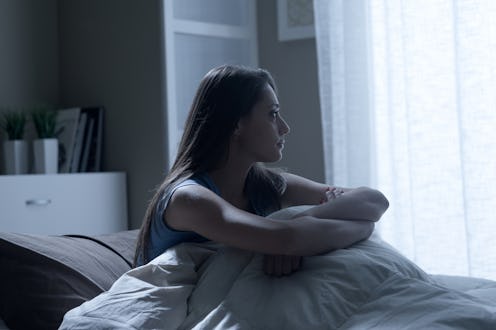Life
This Psychological Condition Could Be The Reason You’re Not Sleeping As Well As You Should Be

You've probably dealt with the occasional bad night of sleep. But what if you're consistently waking up without feeling refreshed, even if you've been in bed for the full recommended seven to nine hours? Night terrors are one of the less common and less talked about sleep disorders that can leave you feeling disoriented and scared like nothing else. Unfortunately, unlike a nightmare, it can be difficult to tell if you're having night terrors when you're sleeping. But, experts say there are signs to look out for in the daytime.
“We all have had nightmares, which are basically dreams with vivid and, sometimes, upsetting or disturbing tones, feelings or content. As long as they are occasional, and you are also having normal dreams, too, it is no big deal. They can even be a good sign that you are getting the REM sleep your body and brain needs. However, there is a separate breed of terrifying ‘parasomnias,’ called night terrors, aka sleep terrors,” Dr. David C. Brodner, M.D., a sleep specialist, and the founder and principal physician at the Center for Sinus, Allergy, and Sleep Wellness, tells Bustle.
According to the American Academy of Sleep Medicine, an estimated 50 to 85% of adults report having the occasional nightmare, while only 2.2% of adults are affected by sleep terrors regularly. Unlike nightmares, the National Sleep Foundation reports that a majority of people who experience night terrors often cannot recall the content of it, and the terror may be paired with sleepwalking. “The most serious of the effects of parasomnias occur when you wake up jolting with a sense of disorientation, often crying, thrashing about, and not making logical sense as you normally would,” Natalie Pennicotte-Collier, a clinical hypnotherapist who specializes in sleep, and a voice of Clementine App, says. As Dr. Brodner further explains, night terrors can also cause increased blood pressure, sweating, and screaming.
Though sleep terrors typically impact children, Dr. Brodner says mental health conditions such as PTSD, depression, and anxiety can make adults more susceptible to night terrors. Additionally, Pennicotte-Collier says that parasomnias are inheritable, and could simply be a “sign of deep sleep disturbed sleeping patterns.” Whatever the underlying cause may be, one of the most frustrating aspects of night terrors is that — unlike nightmares — is that many people can only be partially woken from a night terror, as the Cleveland Clinic reported. In fact, Dr. Brodner tells Bustle that a person experiencing these sleep terrors often does not have any recollection of it the next morning — and, it’s typically a partner or someone else who first notices these types of parasomnias are occurring.
Even if you don’t have someone in your household that can clue you in, there are some signs to look for while you’re awake if you suspect you’re sleep is being disturbed by night terrors. “During the day, [sleep terrors] will have a massive impact on your focus, [and] alertness, and result in a sense of deep fatigue due to the fact that your sleeping patterns have been disrupted,” Pennicotte-Collier explains. Furthermore, Dr. Brodner says that — due to the thrashing or abrupt movements — unexplained bruises, or broken and misplaced items could indicate that someone might be experiencing terrors during the night (so if things started to seem a little Paranormal Activity-ish, you can relax).
Managing night terrors comes down to identifying the root cause. If you’re living with an underlying mental health disorder such as PTSD, some physicians may recommend different types of therapy to help lessen the frequency of night terrors you’re experiencing. In most cases, forming healthy bedtime habits can help beat these parasomnias, according to experts. “Be vigilant about your sleep hygiene cycle. Go to bed on time the same time every night. Put the electronic devices down an hour before bed, and try reading something relaxing, listening to music, or meditating,” Dr. Brodner says. Similarly, Pennicotte-Collier notes that listening to music, or practicing breathing exercises are effective if you do happen to wake up disoriented, or scared during a sleep terror.
Talking to a clinician who specializes in sleep disorders could help confirm your suspicions, and make sure to set you on the right path to stopping your night terrors in their tracks. These terrors are undoubtedly frightening, but with appropriate treatment, you could be snoozing soundly again without a bump in the night — quite literally.